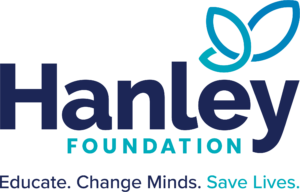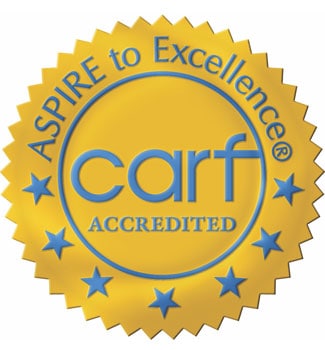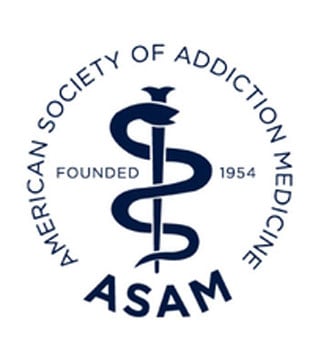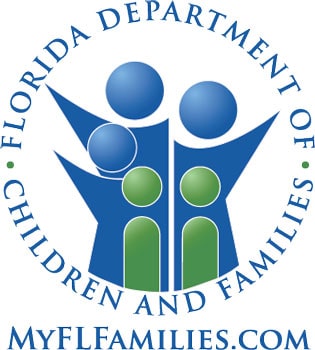Mental Health Disorders

At the Hanley Center, we recognize that society often encourages people to stay silent about mental health struggles, which can make individuals feel isolated and powerless.
According to the National Institutes of Health (NIH), nearly one in five Americans is living with some form of mental health disorder. When left untreated, mental health disorders can impact physical health and contribute to the development of substance use disorders.
However, mental health disorders may also occur on their own. Either way, comprehensive treatment is critical to lifelong recovery.
Treatment for mental health is available and especially recommended for people who have a history of substance abuse, self-harm, suicidal thoughts, legal issues, or violent acts toward others.
As one of the leading mental health treatment centers in Florida, Hanley Center compassionately treats adults with mental health disorders at our Residential Mental Health Program and has co-occurring substance use programs for men, women, and older adults.
Our comprehensive clinical approach focuses on long-term recovery and addresses the following during mental health treatment:
- Trauma
- Depression
- Anxiety
- Bipolar disorders
- Obsessive-compulsive disorders
- Process addictions
- Mood disorders
- Personality disorders
Individuals leave Hanley Center’s Residential Mental Health program with a dedicated case manager to directly access ongoing services and continue their healing journey with a team they feel safe with and have grown to trust.
Patients unique continuing care plan may include the following to help ensure a safe recovery environment:
- Individual therapy
- Ongoing family support
- Marriage or couples counseling
- Psychiatric referrals
- Medication management
- Various self-care techniques
Our integrated approach focuses on healing the whole person.
If you are searching for a safe and supportive mental health treatment center in Florida for yourself or a loved one, Hanley Center can help.
With only ten beds to ensure a personalized experience, our Residential Mental Health Program helps adults and older adults successfully transition back to their lives, homes, families, and careers with a newfound sense of self-worth, direction, and control.
MENTAL HEALTH DISORDERS
Mood disorders
Clinical depression debilitates normal functioning in life. It is the most common co-occurring diagnosis among people with addictive illnesses, along with anxiety.
Bipolar disorder, dysthymia, or substance-induced mood disorders are other types of mood disorders.
Anxiety disorders
Anxiety disorders are the most common type of mental health disorder. People with anxiety may be able to identify what’s creating their symptoms or unaware of the cause.
Generalized anxiety can start in childhood, and women are often diagnosed with it at a higher rate than men. Anxiety can appear after separation or through social contact with either familiar people or strangers. Anxiety can induce panic attacks that last several minutes. Medical conditions or procedures can produce feelings of anxiety, too.
Anxiety includes a broad spectrum of emotional experiences, from reactions to everyday situations to severe anxiety such as PTSD. People with substance use disorders frequently cite anxiety, and it requires specialized care.
Our anxiety disorder treatment center in Florida addresses all aspects of anxiety with a personalized approach to your treatment plan.
Depression and Bipolar disorder
Depression is often misunderstood and has become a misused term for feeling sad.
Major depressive disorder is much more complex and may be accompanied by a loss of interest in things, a sense of worthlessness, sleep issues, self-harm, and suicidal thoughts.
Bipolar disorder is a type of depression with three categories:
Bipolar I
The most intense with manic-depressive symptoms and potentially psychotic episodes.
Bipolar II
This includes alternating depressive and manic episodes.
Cyclothymic Disorder
This condition includes brief episodes of depression and hypomania (e.g., excessive talking, racing thoughts, and excessive fearfulness).
Two types of depression that specifically affect women are premenstrual dysphoric disorder (PMDD) and postpartum depression.
With PMDD, women experience the onset of depression symptoms a week before a monthly period. Postpartum depression occurs when hormone changes following childbirth affect a woman for longer than two weeks.
Additional types of depression include:
Seasonal affective disorder (SAD)
This disorder is connected to a change in seasons, typically with the onset of winter.
Persistent depressive disorder
This disorder is a type of long-term depression that can last for months or even years.
Atypical disorder
Atypical depression is less severe than other types but can be elicited by both negative and positive experiences.
Trauma and Post-Traumatic Stress Disorder (PTSD)
PTSD symptoms can begin when a person experiences trauma at an early age or in adulthood. They are unable to respond to distress and panic in healthy ways. Over time, PTSD can take a toll on their mind and body and cause them to avoid connecting with others.
Post-Traumatic Stress Disorder (PTSD) affects both men and women equally, and traumatic life events trigger it. In drug and alcohol treatment, many with substance use disorder and co-occurring PTSD have suffered verbal, physical, or sexual abuse. Common symptoms include:
Disassociation from oneself and events
- Anger
- Depression
- High anxiety
- Insomnia
Complex PTSD (C-PTSD) stems from prolonged exposure to trauma, leading to a range of symptoms like emotional distress, difficulties in relationships, and physical manifestations of trauma. Recovery involves comprehensive treatment approaches such as therapy modalities like Trauma-Focused Cognitive Behavioral Therapy (TF-CBT), Eye Movement Desensitization and Reprocessing (EMDR), and Dialectical Behavior Therapy (DBT). It’s a valid mental health condition requiring understanding and specialized support for healing and reclaiming a sense of safety and self-worth.
Paranoia
Paranoia isn’t a specific diagnosis but can occur as part of specific mental health disorders, including one where substance abuse is happening.
Certain drugs, such as cocaine and methamphetamine, can create a sense of paranoia. Recognizing the symptoms of paranoia can be a clue to your mental health status.
Symptoms may include:
- Defensiveness
- Hostility
- Aggression
- Believing you’re always right
- Being unable to compromise
- Being unable to trust others
Dissociative Disorders
A loss of connection to thoughts, feelings, memories, or identity is the main characteristic of dissociative disorders.
With this condition, you may feel like you’re watching someone else’s life or have taken over someone else’s body. Your sense of reality becomes altered, and severity and duration can vary.
A short-term dissociative experience could last several hours or a few days. A longer-term dissociative experience may last weeks or months. In many cases, a person’s past trauma can lead to dissociation as a defense mechanism against emotional pain they feel they are unable to handle.
Psychosis
Psychosis is a mental health condition characterized by a loss of connection with reality. A person with psychosis may hallucinate and see or hear people around them who aren’t there. They may have delusions about their accomplishments, their identity, or their relationships. Their delusions may be about being the target of someone’s plot to harm or shame them.
Hallucinations and delusions also affect people with this mental health disorder. They interpret the reality around them in an abnormal way. Their thinking is highly confused, and they may exhibit sudden mood swings. Psychosis could be considered the most intense mental health disorder on the list, and treatment is a lifelong process.
Obsessive-Compulsive Disorders
Obsessive-compulsive disorders are chronic conditions in which a person experiences uncontrollable thoughts, obsessions, or behaviors that the person feels the urge to repeat again and again. When these disorders are combined with addiction, they can severely impact a person’s life.
Process Addictions
Process addictions often co-occur with a substance use disorder, such as shopping, gambling, disordered eating, and sex. Cross-addictive behaviors may exacerbate one another.
Personality Disorders
Personality disorders include borderline personality disorder (BPD), narcissistic personality disorder, and histrionic personality disorder. All three of these disorders are common among people with addiction. Other examples include paranoid personality disorder, schizoid personality disorder, avoidant personality disorder, and dependent personality disorder.
ADHD in adults is a neurodevelopmental disorder characterized by difficulties in attention, hyperactivity, and impulsivity. While often associated with childhood, ADHD can persist into adulthood, impacting various aspects of daily life, including work, relationships, and self-esteem. Diagnosis and management typically involve a combination of medication, therapy, and practical strategies to improve focus, organization, and impulse control.
Codependency is a behavioral condition in which individuals prioritize others’ needs and emotions over their own, often to their detriment. It typically manifests in unhealthy, one-sided relationships where boundaries are blurred, and individuals may enable or be excessively reliant on each other. Addressing codependency involves establishing healthy boundaries, fostering self-awareness, and developing self-care practices to cultivate balanced, mutually supportive relationships.
Mental Health Disorders Are Complex—Integrative Treatment Is the Answer
Treatment for each mental health disorder varies from person to person, but there are some shared elements of any treatment—a proper diagnosis is one of them.
Patients in mental health treatment can learn strategies for coping with symptoms and practice replacement behaviors that are positive and productive. Hanley’s residential programs, with individual therapy and group sessions, provide multiple evidence-based therapies to help in the healing process. They include integrated therapies such as:
- Cognitive behavioral therapy (CBT)
- Motivational interviewing
- Trauma therapies(e.g., Eye Movement Desensitization and Reprocessing or EMDR)
Integrated mental health treatment at our behavioral health facility is a comprehensive approach that offers all the therapeutic resources necessary to aid physical, mental, emotional, and psychological healing.
Living with a mental disorder increases the likelihood of developing substance use disorder—and vice versa. A mental health disorder may have preceded drug or alcohol abuse in some cases. In other instances, mental health symptoms appear after addiction has taken hold—and these conditions can be worsened by drug use.
For people with co-occurring disorders, a comprehensive treatment plan should include:
- Evidence-based therapy
- Medical care (including medication, when appropriate)
- Psychiatric services and ongoing care
- Case management
- Family education and programming
- Life skills training
- Recovery support
- Continuing care planning
Hanley Center has been treating people with co-occurring disorders for over four decades. With the right help, we know people can and do recover.

Treatment Begins with an Assessment
Every patient deserves a treatment plan customized to their specific needs.
We offer tests such as:
- PEPQ (PsychEval Personality Questionnaire)
- MMPI-2 (Minnesota Multiphasic Personality Inventory-2)
- MCMI (Millon Clinical Multiaxial Inventory)
In addition to clinical interviews and sessions with their primary therapist, our thorough assessment provides a foundation for meeting each patient’s unique needs.
Effective treatment of co-occurring disorders requires treatment simultaneously by the same care team at the same location. Our medically intensive and multi-disciplinary programming treats mental health disorders and co-occurring disorders through the expertise of our highly trained professionals.
Our treatment teams address not only the physical and mental needs of our patients but also their psychological and spiritual needs. Every day, our highly trained staff members—from medical professionals to licensed therapists and psychiatrists—gather to discuss patient cases and work towards solutions. A specialized, integrated treatment model has been proven to improve outcomes and quality of life.
Center for Brain Recovery
Co-occurring disorders can negatively affect and exacerbate each other, which makes successful treatment more challenging.
The Center for Brain Recovery (CBR) at Hanley Center, our health psychology department, is an innovative mental health treatment program that promotes brain health through evidence-based therapies. CBR services are specifically designed to recognize the connection between addiction and mental health disorders and provide treatment that addresses both concerns simultaneously, offering our patients a greater chance at long-term recovery.
Learn more about the Center for Brain Recovery here.
We have Continuing Care for the Whole Family
Those with co-occurring disorders require lifelong support. Our team of continuing care specialists at our mental health treatment center in Florida works with patients and their families to develop a discharge plan that leads to long-term success. These recommendations may include:
- Ongoing therapy
- Intensive outpatient care
- Scheduled appointments with psychiatrists and medical doctors
- Medication management
- Wellness recommendations
- Transitional living
- 12-Step programming and fellowship
Our licensed family and marriage therapists also work with our patient’s families to build a continuing care plan that supports family healing.
Learn more about Hanley’s Family Program here.
Recovery is possible, and people do recover.
Although there is no cure for any mental health disorder, including addiction, many individuals go on to lead extraordinary lives filled with hope and courage. Treatment interventions based on research have proven effective in treating patients living with mental health disorders and co-occurring diagnoses. The key is to receive personalized treatment at a psychiatric facility that is intensive and integrated. People with mental health disorders can recover with long-term support and therapeutic interventions.
Hanley Center is one of the top mental health facilities in Florida, offering a range of treatment programs targeting recovery from substance use, mental health issues, and beyond.
We offer renowned clinical care for mental illnesses and have the compassion and professional expertise to guide you toward lasting wellness.
For information on our mental health treatment programs, call us today at 561-841-1033.
Hanley Center: Most Insurance Accepted
Address: 933 45th Street
West Palm Beach, FL 33407




